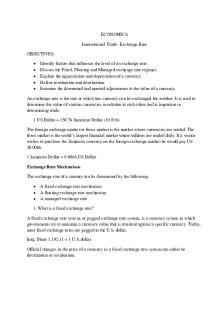Chapter 9 Notes - Social Exchange Theory PDF

| Title | Chapter 9 Notes - Social Exchange Theory |
|---|---|
| Course | Communication Theory |
| Institution | Sam Houston State University |
| Pages | 2 |
| File Size | 54.9 KB |
| File Type | |
| Total Downloads | 96 |
| Total Views | 143 |
Summary
Chapter 9 Notes - Social Exchange Theory...
Description
Chapter 9 Social Exchange Theory Based on the research of John Thibaut and Harold Kelley Costs - elements of relational life with negative value Rewards - elements of relational life with positive value Outcome - whether people continue in a relationship or terminate it
Assumptions of Social Exchange Theory The assumptions that Social Exchange Theory makes about human nature include the following: Humans seek rewards and avoid punishments. Humans are rational beings. The standards that humans use to evaluate costs and rewards vary over time and from person to person. The assumptions Social Exchange Theory makes about the nature of relationships include the following: Relationships are interdependent. Relational life is a process.
Evaluating a Relationship comparison level (CL) - a standard for what a person thinks he or she should get in a relationship comparison level for alternatives (CLalt) - how people evaluate a relationship based on what their alternatives to the relationship are
Exchange Patterns: SET in Action behavioral sequences - a series of actions designed to achieve a goal power - the degree of dependence a person has on another for outcomes fate control - the ability to affect a partner’s outcomes behavior control - the power to change another’s behavior
given matrix - the constraints on your choices due to the environment and/or your own skill levels effective matrix - the transformations you are able to make to your given matrix, by learning a new skill, for example dispositional matrix - the beliefs you have about relationships
Exchange Structures direct exchange - an exchange where two people reciprocate costs and rewards generalized exchange - an exchange where reciprocation involves the social network and isn’t confined to two individuals productive exchange - an exchange where both partners incur costs and benefits simultaneously
Integration, Critique, and Closing Communication Tradition – Socio-Psychological Communication Context – Intrapersonal and Interpersonal Approach to Knowing – Positivistic/Empirical Critique – Scope, Utility, Testability, Heurism...
Similar Free PDFs

Social Exchange Theory
- 1 Pages

Chapter 9 - Foreign Exchange Market
- 18 Pages

Affection Exchange Theory
- 2 Pages

Chapter 9 - Lecture notes 9
- 1 Pages

Chapter 9 - Lecture notes 9
- 5 Pages

Chapter 9 - Lecture notes 9
- 9 Pages

Chapter 9 - Lecture notes 9
- 7 Pages

Chapter 9 - Lecture notes 9
- 6 Pages

Exchange Rates - economics notes
- 4 Pages
Popular Institutions
- Tinajero National High School - Annex
- Politeknik Caltex Riau
- Yokohama City University
- SGT University
- University of Al-Qadisiyah
- Divine Word College of Vigan
- Techniek College Rotterdam
- Universidade de Santiago
- Universiti Teknologi MARA Cawangan Johor Kampus Pasir Gudang
- Poltekkes Kemenkes Yogyakarta
- Baguio City National High School
- Colegio san marcos
- preparatoria uno
- Centro de Bachillerato Tecnológico Industrial y de Servicios No. 107
- Dalian Maritime University
- Quang Trung Secondary School
- Colegio Tecnológico en Informática
- Corporación Regional de Educación Superior
- Grupo CEDVA
- Dar Al Uloom University
- Centro de Estudios Preuniversitarios de la Universidad Nacional de Ingeniería
- 上智大学
- Aakash International School, Nuna Majara
- San Felipe Neri Catholic School
- Kang Chiao International School - New Taipei City
- Misamis Occidental National High School
- Institución Educativa Escuela Normal Juan Ladrilleros
- Kolehiyo ng Pantukan
- Batanes State College
- Instituto Continental
- Sekolah Menengah Kejuruan Kesehatan Kaltara (Tarakan)
- Colegio de La Inmaculada Concepcion - Cebu






